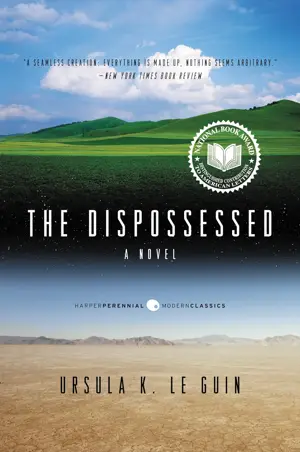The Dispossessed

To visit Urras—to learn, to teach, to share—will require great sacrifice and risks, which Shevek willingly accepts.
Set in a distant future we follow the life of Shevek, a brilliant physicist from the planet Anarres. Settled by anarchists who sought to create a society free from the constraints of capitalism and hierarchy, Annares is peaceful though poor compared to Urras. Shevek, however, becomes disillusioned with the shortcomings of his society and seeks to challenge its status quo. He embarks on a journey to the neighboring planet, Urras, which represents a more traditional and capitalist society, but is it what Shevek seeks? There, he hopes to share his scientific knowledge and bridge the gap between the two worlds then return to Annares with hopeful news; however, the longer he stays the less it looks like it won't happen.
A contrast in ideologies
Le Guin skillfully presents the contrasting ideologies of Anarres and Urras, highlighting the flaws and virtues of both. Anarres, with its communal living and lack of personal possessions, strives for equality and cooperation. Urras, on the other hand, embodies the excesses of capitalism and the inherent inequalities that come with it. Shevek's experiences on Urras make us confront the complexities of freedom and the challenges of building a just society.
The Dispossessed delves deep into philosophical and political questions, challenging the reader to question their own beliefs and assumptions. Le Guin's prose is thoughtful and rich, exploring themes of individualism, collectivism, and the tension between the two. She presents a nuanced portrayal of the human condition, highlighting the struggles and triumphs of individuals within larger societal structures.
The Dispossessed is part six of Le Guin's Hanish Cycle. The Left Hand of Darkness is part four.